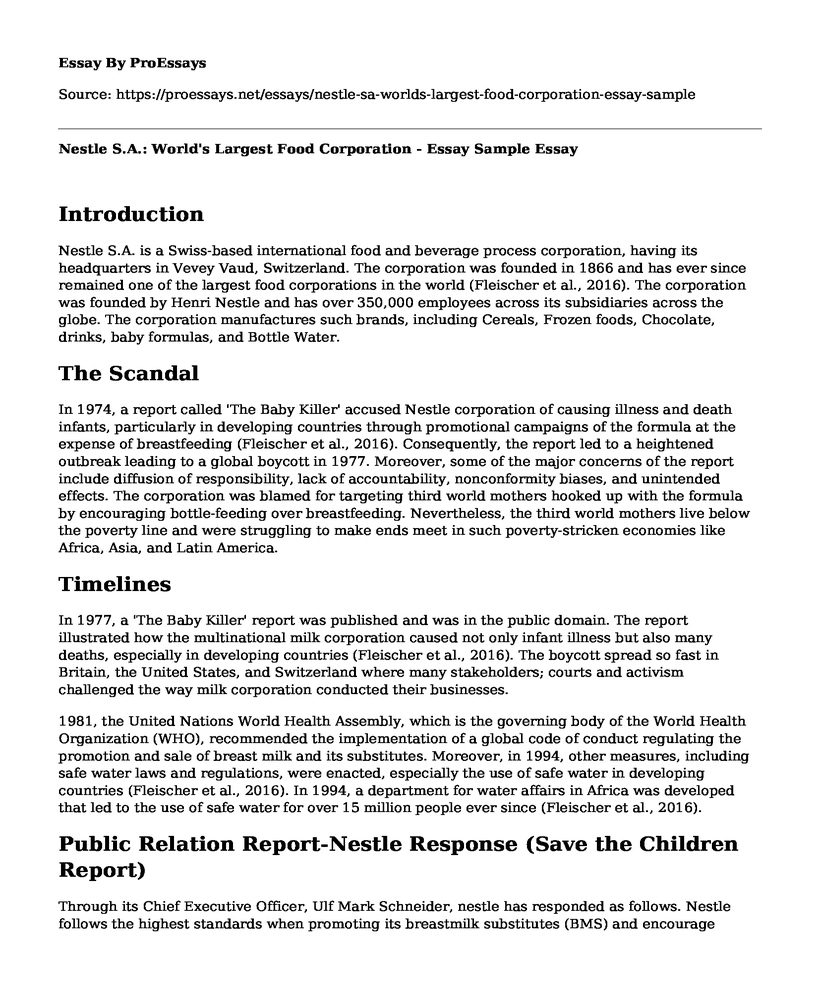Introduction
Nestle S.A. is a Swiss-based international food and beverage process corporation, having its headquarters in Vevey Vaud, Switzerland. The corporation was founded in 1866 and has ever since remained one of the largest food corporations in the world (Fleischer et al., 2016). The corporation was founded by Henri Nestle and has over 350,000 employees across its subsidiaries across the globe. The corporation manufactures such brands, including Cereals, Frozen foods, Chocolate, drinks, baby formulas, and Bottle Water.
The Scandal
In 1974, a report called 'The Baby Killer' accused Nestle corporation of causing illness and death infants, particularly in developing countries through promotional campaigns of the formula at the expense of breastfeeding (Fleischer et al., 2016). Consequently, the report led to a heightened outbreak leading to a global boycott in 1977. Moreover, some of the major concerns of the report include diffusion of responsibility, lack of accountability, nonconformity biases, and unintended effects. The corporation was blamed for targeting third world mothers hooked up with the formula by encouraging bottle-feeding over breastfeeding. Nevertheless, the third world mothers live below the poverty line and were struggling to make ends meet in such poverty-stricken economies like Africa, Asia, and Latin America.
Timelines
In 1977, a 'The Baby Killer' report was published and was in the public domain. The report illustrated how the multinational milk corporation caused not only infant illness but also many deaths, especially in developing countries (Fleischer et al., 2016). The boycott spread so fast in Britain, the United States, and Switzerland where many stakeholders; courts and activism challenged the way milk corporation conducted their businesses.
1981, the United Nations World Health Assembly, which is the governing body of the World Health Organization (WHO), recommended the implementation of a global code of conduct regulating the promotion and sale of breast milk and its substitutes. Moreover, in 1994, other measures, including safe water laws and regulations, were enacted, especially the use of safe water in developing countries (Fleischer et al., 2016). In 1994, a department for water affairs in Africa was developed that led to the use of safe water for over 15 million people ever since (Fleischer et al., 2016).
Public Relation Report-Nestle Response (Save the Children Report)
Through its Chief Executive Officer, Ulf Mark Schneider, nestle has responded as follows. Nestle follows the highest standards when promoting its breastmilk substitutes (BMS) and encourage external investigations to our processes and practices. We have an international code of commitment and operation, which supports breastfeeding as outlined by the World Health Organization. Moreover, the report outlines several instances of non-compliance with the WHO code of operations. Therefore, in order to curb instances of non-compliance, nestle has vowed to take necessary actions to verify cases of non-compliance by asking the children and affected stakeholders to avail documents of assessment to confirm that allegations and thus prompt action taken.
We, as a corporation, take the actions with the seriousness they deserve, and investigation will be conducted to ascertain their correctness. Moreover, the CEO proceeds to mention that 'our employees are aware that we will initiate decisive and fast actions in any case the allegations have been proved.' Furthermore, we are confident in our statements since we have a comprehensive system that can be used to market breastmilk substitutes transparently and responsible in accordance with the regulations. Besides, the corporation policy on a promotional campaign of BMS applies to the Nestle and its subsidiaries and relevant third parties working with the organization. To put this into practice, were frequently train our employees with relevant and up to date code of compliance.
References
Fleischer, D. M., Venter, C., & Vandenplas, Y. (2016). Hydrolyzed Formula for Every Infant? Nestle Nutrition Institute Workshop Series, 51-65. https://doi.org/10.1159/000442956
Cite this page
Nestle S.A.: World's Largest Food Corporation - Essay Sample. (2023, May 03). Retrieved from https://proessays.net/essays/nestle-sa-worlds-largest-food-corporation-essay-sample
If you are the original author of this essay and no longer wish to have it published on the ProEssays website, please click below to request its removal:
- Research Paper on Walmart Inc
- Essay Example on Healthy Breakfast Options Emerging in American Market
- Research Paper on Nike: Dominant Player in Global Sports Equipment Market
- Americans Love Starbucks Despite Preferring Competitors' Coffee Quality
- Essay on Hilton Worldwide & Coca-Cola: Targeting Middle & Senior-Aged Professionals
- Paper Example on Nutrition: A Vital Key to a Healthy Lifestyle
- Free Essay Sample on Two Major ERP Software Solutions







